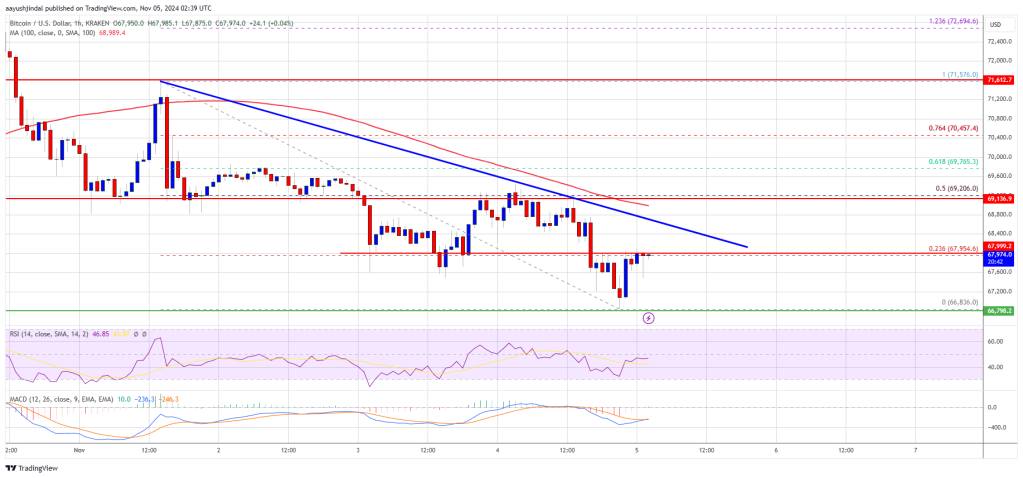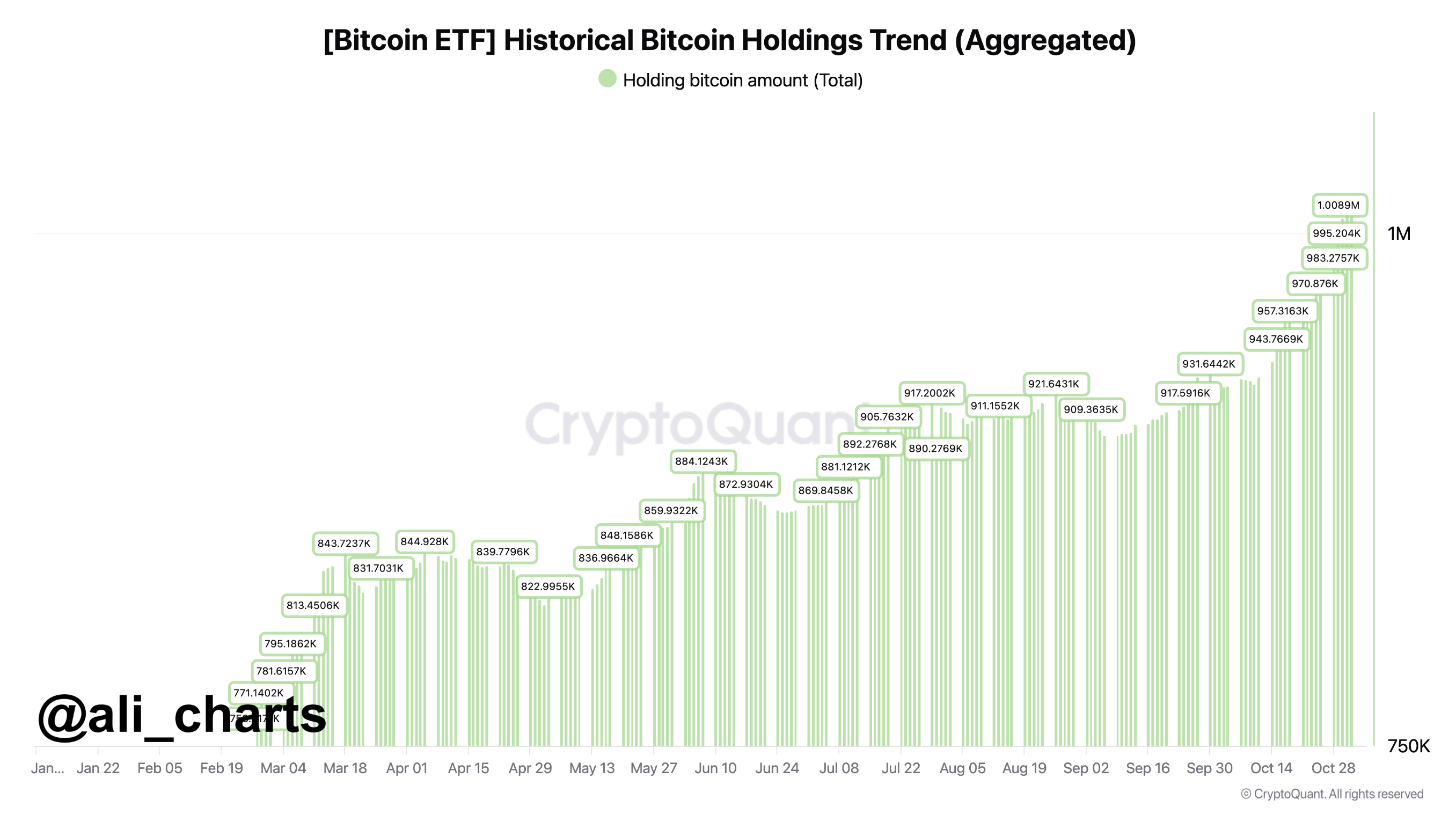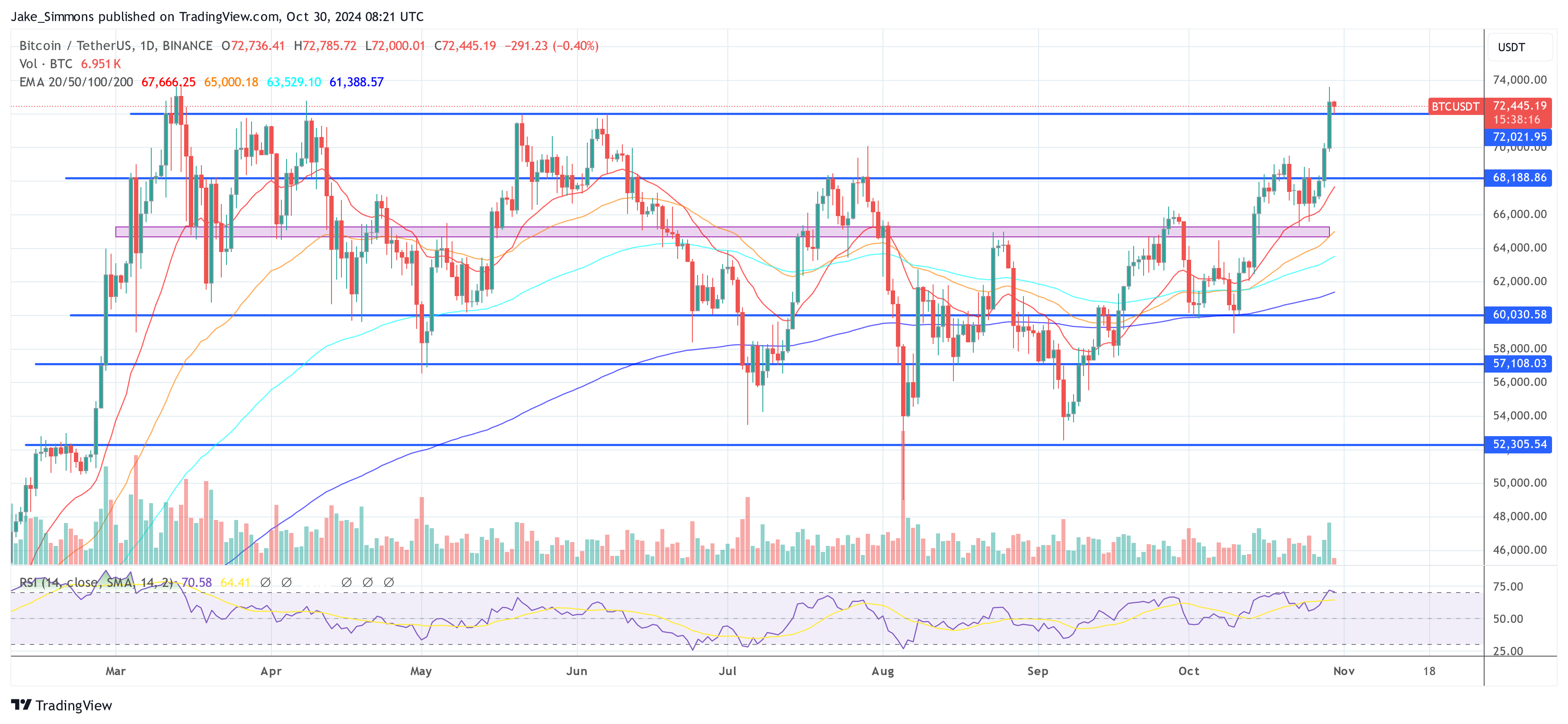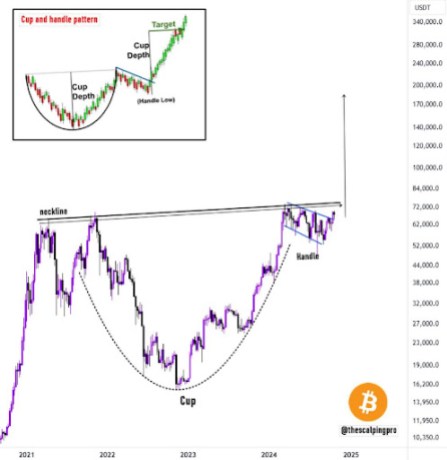Bernstein Research, the esteemed research arm of global asset manager AllianceBernstein, is projecting that Bitcoin will reach $200,000 by the end of 2025. The firm, which manages assets worth $791 billion as of August 2024, labels this prediction as “conservative” in its latest 160-page “Black Book” on Bitcoin.
Bernstein’s report, titled “From Coin to Computing: The Bitcoin Investing Guide,” delves into the multifaceted dynamics propelling Bitcoin’s ascent. The firm underscores the surge in institutional adoption, the burgeoning market for Bitcoin exchange-traded funds (ETFs), and the evolving role of Bitcoin miners in both the cryptocurrency and artificial intelligence (AI) sectors.
“If you are a Bitcoin skeptic … maybe a limited supply, ‘store of value’ digital asset is not such a bad thing in a world where U.S. debt hits new records ($35 trillion now) and threats of inflation still loom. If you like gold here, you should love Bitcoin even more,” writes Gautam Chhugani, Managing Director and Senior Analyst at Bernstein.
The report highlights a significant shift in institutional investment patterns. According to Bernstein, global asset managers now hold approximately $60 billion worth of Bitcoin and Ethereum ETFs, a fivefold increase from $12 billion in September 2022. The firm describes the launch of these ETFs as “the most successful in the history of exchange-traded funds,” noting $18.5 billion in inflows year-to-date since their introduction in January.
“By 2024 end, we expect Wall Street to replace Satoshi as the top Bitcoin wallet,” the report states. Bernstein attributes this surge to the logistical challenges of self-custody for retail investors. “With institutional players flocking to Bitcoin, ETFs are proving to be the entry point for large-scale investment in digital assets,” the firm notes.
Bernstein’s bullish stance on Bitcoin is underpinned by its analysis of market trends and institutional behavior. BTC price has already appreciated by 120% over the past 12 months, with its market capitalization swelling to $1.3 trillion.
“With institutional adoption accelerating, we expect Bitcoin to triple from its current levels,” Bernstein projects. The firm anticipates that Bitcoin’s market cap could expand to over $3 trillion by the end of 2025, driven by increased allocations from wealth management platforms, pension funds, and registered investment advisors.
The report also suggests that larger financial institutions will play a more dominant role as the market matures. “This new institutional era, in our view, could push Bitcoin to a high of $200,000 by 2025 end,” the analysts write, emphasizing that the forecast is “conservative” given the current trajectory of institutional involvement.
Another focal point of Bernstein’s report is the growing adoption of Bitcoin as a corporate treasury asset. The firm highlights MicroStrategy Incorporated (NASDAQ: MSTR) as a pioneering example. Led by CEO Michael Saylor, MicroStrategy has allocated more than 99% of its cash holdings to Bitcoin, owning approximately 1.3% of the total Bitcoin supply.
“We view MicroStrategy as an active leveraged Bitcoin equity strategy,” Bernstein states, pointing out that the company’s stock has offered superior returns compared to holding Bitcoin directly or via ETFs.
Bernstein’s report also sheds light on the consolidation trends within the Bitcoin mining industry. Major players like Riot Platforms (NASDAQ: RIOT), CleanSpark (NASDAQ: CLSK), and Marathon Digital Holdings are acquiring smaller miners, leading to an industry dominated by industrial-scale operations.
“Leading US Bitcoin miners are consolidating share and becoming energy infrastructure players,” the report notes. “We expect Riot, CleanSpark, and Marathon to consolidate the Bitcoin mining industry.” Bernstein predicts that these leading miners will control 30% of Bitcoin’s total hashrate by 2025.
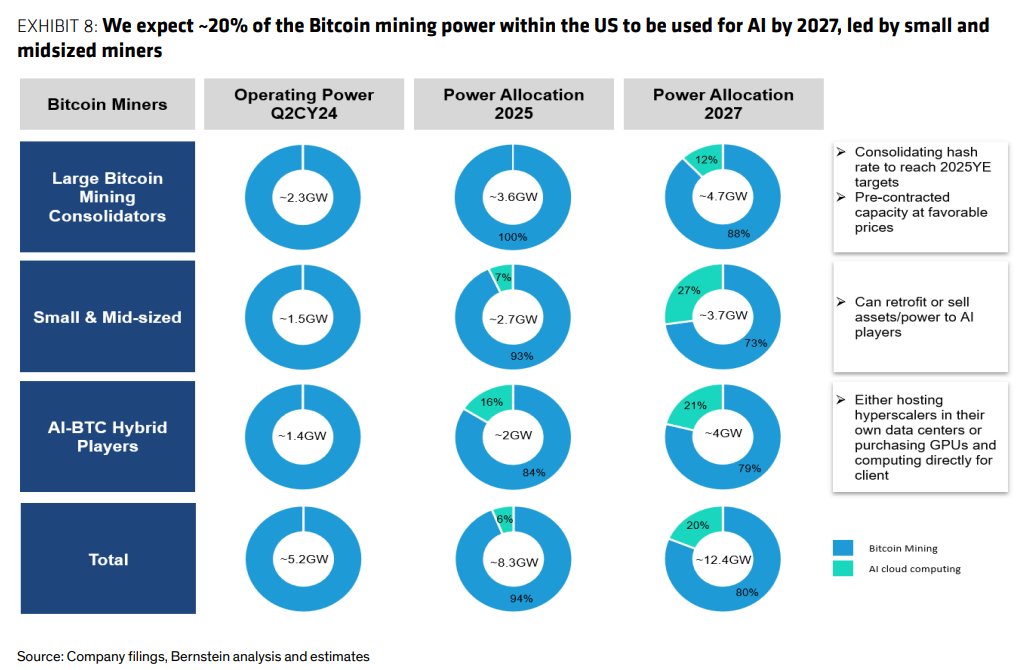
The analysts further explore the synergy between Bitcoin mining and AI infrastructure. Bitcoin miners are emerging as attractive partners for GPU cloud providers, offering gigawatt-scale energy access and reducing the “time to market” for energizing AI data centers.
“Miners present an energy arbitrage opportunity, trading at $2-4 million per megawatt, compared to $30-50 million per megawatt for legacy data centers,” Bernstein observes. Companies like Core Scientific and Iris Energy are capitalizing on this by developing AI data centers alongside Bitcoin mining operations.
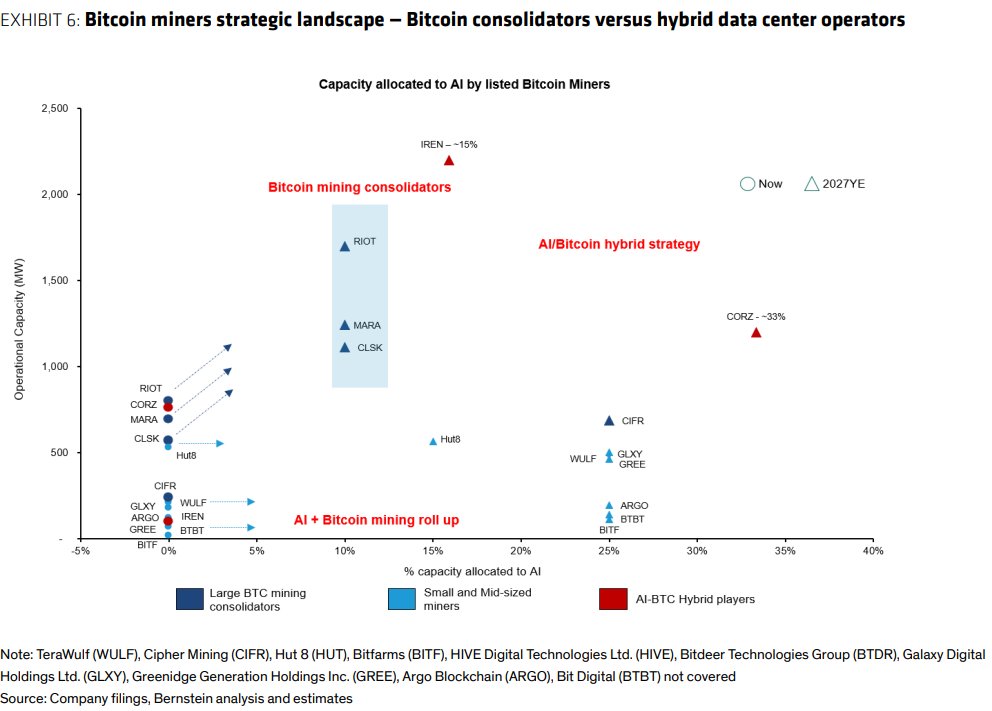
“Bitcoin miners are evolving into essential partners for AI data centers as they capitalize on excess energy capacity and offer efficient solutions for high-performance computing,” Bernstein states. This convergence not only diversifies revenue streams for miners but also enhances the sustainability and scalability of AI infrastructures.
At press time, BTC traded at $67,162.
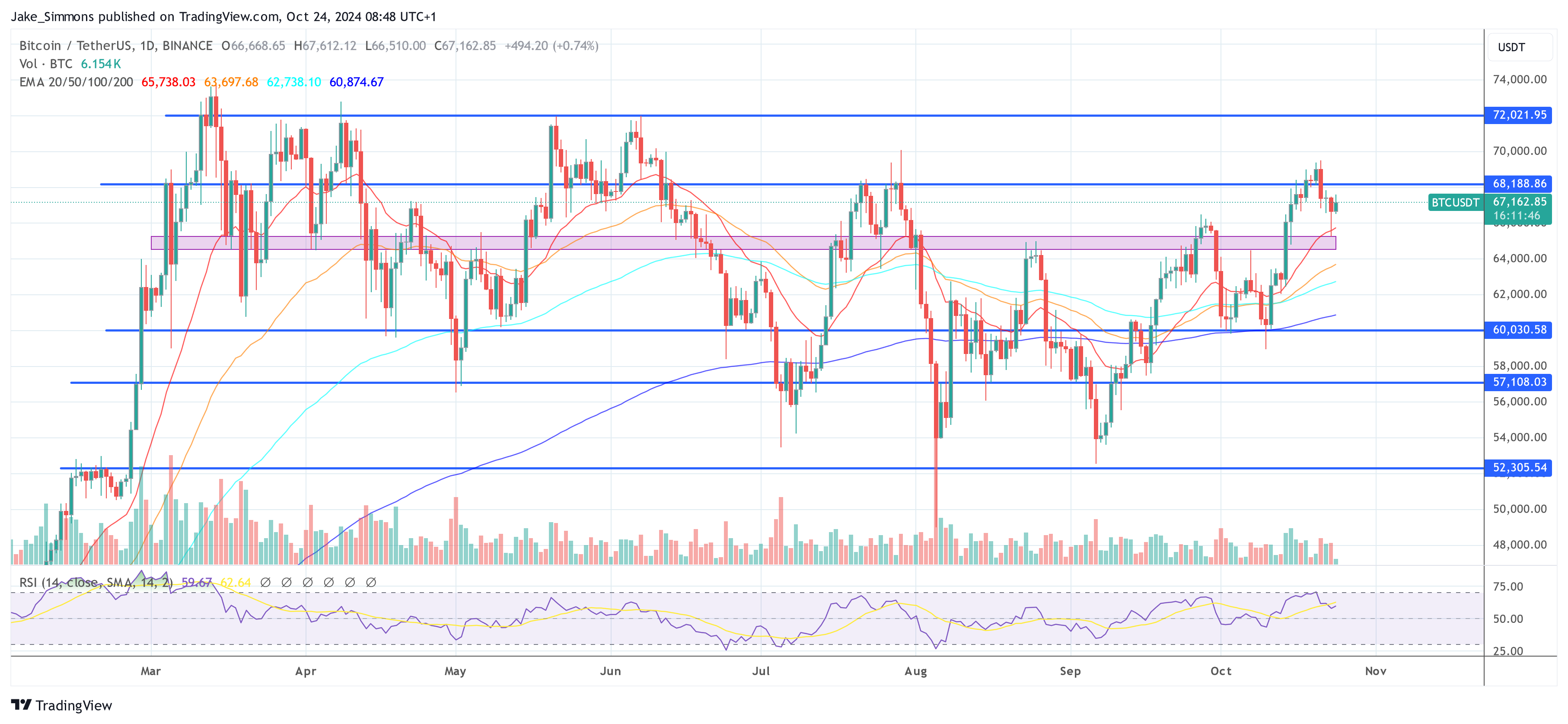
Why BTC Price Will Hit $200,000 In 2025
Bernstein’s report, titled “From Coin to Computing: The Bitcoin Investing Guide,” delves into the multifaceted dynamics propelling Bitcoin’s ascent. The firm underscores the surge in institutional adoption, the burgeoning market for Bitcoin exchange-traded funds (ETFs), and the evolving role of Bitcoin miners in both the cryptocurrency and artificial intelligence (AI) sectors.
“If you are a Bitcoin skeptic … maybe a limited supply, ‘store of value’ digital asset is not such a bad thing in a world where U.S. debt hits new records ($35 trillion now) and threats of inflation still loom. If you like gold here, you should love Bitcoin even more,” writes Gautam Chhugani, Managing Director and Senior Analyst at Bernstein.
The report highlights a significant shift in institutional investment patterns. According to Bernstein, global asset managers now hold approximately $60 billion worth of Bitcoin and Ethereum ETFs, a fivefold increase from $12 billion in September 2022. The firm describes the launch of these ETFs as “the most successful in the history of exchange-traded funds,” noting $18.5 billion in inflows year-to-date since their introduction in January.
“By 2024 end, we expect Wall Street to replace Satoshi as the top Bitcoin wallet,” the report states. Bernstein attributes this surge to the logistical challenges of self-custody for retail investors. “With institutional players flocking to Bitcoin, ETFs are proving to be the entry point for large-scale investment in digital assets,” the firm notes.
Bernstein’s bullish stance on Bitcoin is underpinned by its analysis of market trends and institutional behavior. BTC price has already appreciated by 120% over the past 12 months, with its market capitalization swelling to $1.3 trillion.
“With institutional adoption accelerating, we expect Bitcoin to triple from its current levels,” Bernstein projects. The firm anticipates that Bitcoin’s market cap could expand to over $3 trillion by the end of 2025, driven by increased allocations from wealth management platforms, pension funds, and registered investment advisors.
The report also suggests that larger financial institutions will play a more dominant role as the market matures. “This new institutional era, in our view, could push Bitcoin to a high of $200,000 by 2025 end,” the analysts write, emphasizing that the forecast is “conservative” given the current trajectory of institutional involvement.
Bitcoin Treasury And Mining
Another focal point of Bernstein’s report is the growing adoption of Bitcoin as a corporate treasury asset. The firm highlights MicroStrategy Incorporated (NASDAQ: MSTR) as a pioneering example. Led by CEO Michael Saylor, MicroStrategy has allocated more than 99% of its cash holdings to Bitcoin, owning approximately 1.3% of the total Bitcoin supply.
“We view MicroStrategy as an active leveraged Bitcoin equity strategy,” Bernstein states, pointing out that the company’s stock has offered superior returns compared to holding Bitcoin directly or via ETFs.
Bernstein’s report also sheds light on the consolidation trends within the Bitcoin mining industry. Major players like Riot Platforms (NASDAQ: RIOT), CleanSpark (NASDAQ: CLSK), and Marathon Digital Holdings are acquiring smaller miners, leading to an industry dominated by industrial-scale operations.
“Leading US Bitcoin miners are consolidating share and becoming energy infrastructure players,” the report notes. “We expect Riot, CleanSpark, and Marathon to consolidate the Bitcoin mining industry.” Bernstein predicts that these leading miners will control 30% of Bitcoin’s total hashrate by 2025.

The analysts further explore the synergy between Bitcoin mining and AI infrastructure. Bitcoin miners are emerging as attractive partners for GPU cloud providers, offering gigawatt-scale energy access and reducing the “time to market” for energizing AI data centers.
“Miners present an energy arbitrage opportunity, trading at $2-4 million per megawatt, compared to $30-50 million per megawatt for legacy data centers,” Bernstein observes. Companies like Core Scientific and Iris Energy are capitalizing on this by developing AI data centers alongside Bitcoin mining operations.

“Bitcoin miners are evolving into essential partners for AI data centers as they capitalize on excess energy capacity and offer efficient solutions for high-performance computing,” Bernstein states. This convergence not only diversifies revenue streams for miners but also enhances the sustainability and scalability of AI infrastructures.
At press time, BTC traded at $67,162.


